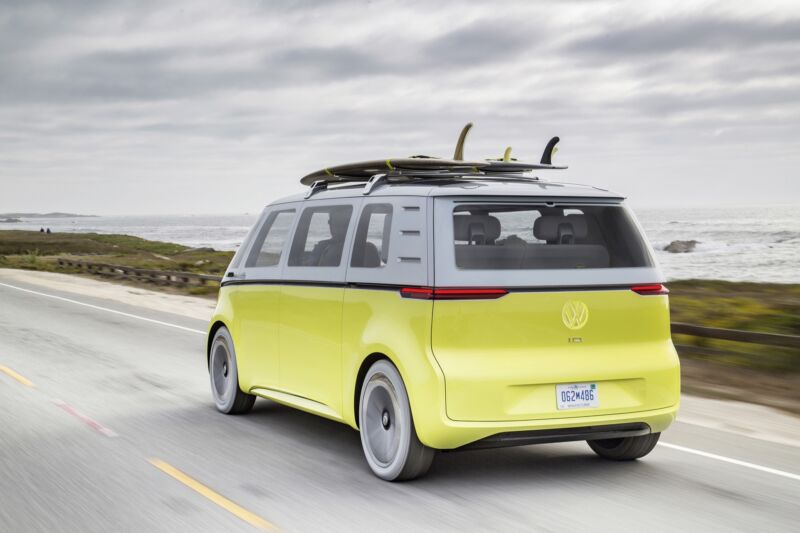What’s one more? —
Automaker also plans to offer video games that drivers can play while charging.
Tim De Chant
–

Enlarge / This one is destined to go on sale in 2023. You can watch a short video we made about it back in 2017.
The future of driving may cost you $8.50 per hour if Volkswagen follows through on its boardroom musings.
The German automaker is considering charging an hourly fee for access to autonomous driving features once those features are ready. The company is also exploring a range of subscription features for its electric vehicles, including “range or performance” increases that can be purchased on an hourly or daily basis, said Thomas Ulbrich, a Volkswagen board member, to the German newspaper Die Welt. Ulbrich said the first subscription features will appear in the second quarter of 2022 in vehicles based on Volkswagen’s MEB platform, which underpins the company’s new ID.3 compact car and ID.4 crossover.
The executive said that Volkswagen will also offer video games in cars, similar to Tesla’s arcade. “In the charging breaks, even if they only last 15 minutes, we want to offer customers something,” Ulbrich said. He said the automaker wouldn’t be developing the games themselves, and it’s not clear whether they’ll come preinstalled or be available for purchase through an app store.
Volkswagen’s real moneymaker might be autonomous driving, though. “In autonomous driving, we can imagine that we switch it on by the hour. We assume a price of around seven euros per hour. So if you don’t want to drive yourself for three hours, you can do it for 21 euros,” said Klaus Zellmer, chief sales officer of the Volkswagen brand.
In a swipe at Tesla, he said that by charging hourly fees, VW would make autonomous driving more accessible than “a car with a five-digit surcharge.”
That’s not to say Volkswagen isn’t hoping to make serious money off the subscriptions. In total, Zellmer said he anticipates the subscriptions will eventually make the company hundreds of millions of euros in additional revenue.
Over the past couple of years, Volkswagen has devoted an increasing amount of attention to the software that goes into its vehicles. In 2019, the company launched an effort to streamline its software. At the time, across all VW Group brands, the company had eight different electronic architectures. For an automaker that prides itself on developing a handful of mechanical platforms it can tweak to fit different segments, that diversity of architectures was inefficient and wasteful. VW Group merged all its software departments into one internal group, which changed its name to Cariad in November.
“Cariad is extremely important for our future in the group,” Ulbrich said. “As a brand, the unit develops the basis for future electric cars. This allows us to focus on software for the vehicle and applications for customers.”
Willingness to pay
Automakers have been salivating over the idea of subscription revenue for years. As more features in vehicles are managed through software, the thought of flipping a switch to enable or disable them has grown more and more appealing. And after watching software companies make the switch, it’s no surprise that car companies are taking serious steps to bake subscriptions into their offerings.
Volkswagen isn’t the first car company to mull subscriptions or after-sales purchases. Tesla once offered Model S cars with a 75 kWh battery that was software-restricted to output only 60 or 70 kWh, depending on when the car was purchased. In the case of the 70 kWh models, customers could pay $3,250 to unlock the last 9.33 percent. More recently, Telsa temporarily unlocked extra range in those and other models to give customers affected by hurricanes and wildfires extra juice to drive to safety.
BMW notably charged an $80-per-year subscription for CarPlay in its 2019 models. It was a deal for lessees, who saved $60 over a three-year lease compared with buying the feature outright. But the subscription also meant that BMW could double-dip when reselling the car, offering a similar subscription or outright purchase to the second owner. And if you wanted to keep your car more than three years, the deal was terrible. BMW gave everyone a year of free trials, and before the trials were set to end, the company decided to offer the software free to all owners. (BMW hasn’t given up the idea and is testing subscriptions for other features in some markets.)
Whether Volkswagen’s mooted offerings will be embraced by consumers remains to be seen. Temporary range increases could catch on if the price is right. As someone who is now on his third EV, I can tell you that I’d happily pay for temporary range increases if they would save me money over paying for full capacity upfront. Most EVs have batteries that far exceed my daily driving range. Performance increases might be harder to sell on an hourly or daily basis—they might make track days more fun, but I think it would be hard to go back to a detuned model the next day.
Autonomous driving is what will likely make or break Volkswagen’s subscription ambitions. Seven euros—$8.50—per hour is a lot of money to spend to let the car drive itself. Yes, it allows people to do something other than drive, and for some drivers, the extra time will be worth it. But for most, the decision will be harder. In studies of willingness to pay for autonomous driving, the range tends to be $1,000–$7,000, which would buy you between 120–820 hours on Volkswagen’s plan. In 2018, commuters drove an average of 225 hours per year. Drivers typically value their time at 20–40 percent of their wages, and given that the average American wage is around $52,000 per year, or about $26 per hour, Volkswagen isn’t necessarily being unreasonable with its pricing.

